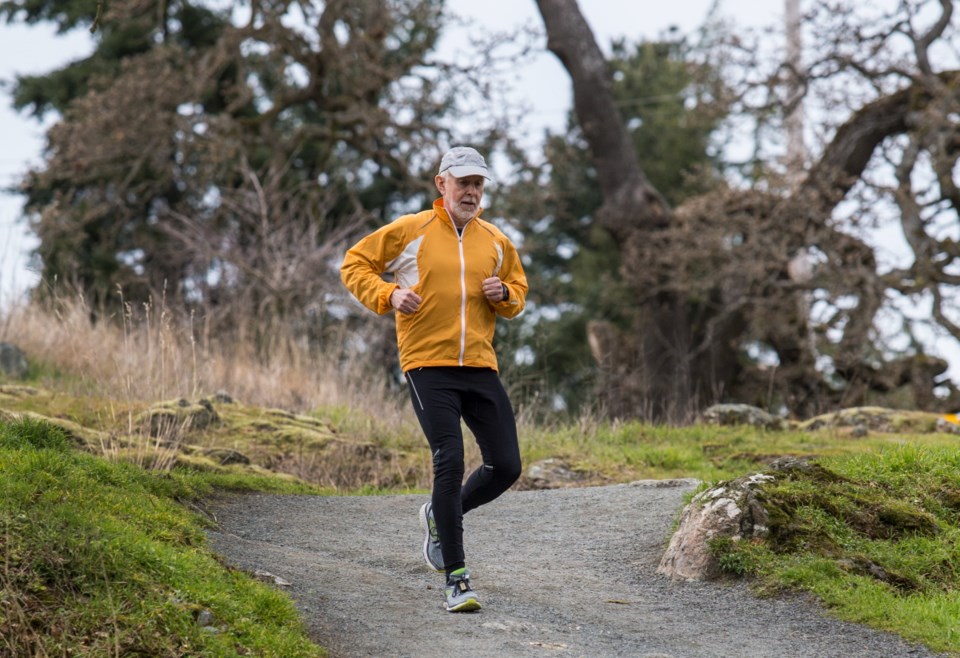Two years ago, Rick Caswell ran the Times Colonist 10K in 49 minutes.
This year, the 68-year-old will be more than happy to cross the finish line in just under an hour. A serious heart attack in December 2016 followed by bypass surgery has slowed him down.
“My goal is to have a safe, healthy run,” says the former Camosun College communications professor. “I’ve adjusted my attitude toward life. The heart attack was a major event. I learned I needed to go from where I am now. The new reality is about accepting the new normal.”
Caswell talked about his heart attack, long recovery and return to running a few weeks ago at the Cedar Hill 10K running clinic where he’s been a regular for more than six years. Every Sunday morning, from late January to race day on April 29, the gym is filled with 79 runners and walkers of all ages and abilities.
Caswell wasn’t sure he was ready to return to the clinic this year.
“But I like the feeling you get in the room when everyone is happy and talking,” he says. “And it’s the motivation factor of having a set time to go and having a set number of homework runs to do. I already feel stronger with the clinic.”
Caswell’s world changed on the morning of Dec. 29, 2016. He and his old dog were out for a walk, making their way slowly up a hill near home.
The plodding old dog was doing just fine. Caswell wasn’t.
“All of a sudden I didn’t feel well. I felt discomfort in my chest and had some trouble breathing. I walked home. I wasn’t sure what was going on.”
Caswell was in denial about what the troubling symptoms could mean. His wife, Rosemary Mason, noticed he didn’t look well and suggested a trip to the emergency room. Caswell phoned his doctor first, who told him to get checked out.
“He said: ‘I wouldn’t forgive myself if I didn’t tell you to go and something really was the matter.’ ”
Caswell was assessed quickly at the Royal Jubilee Hospital. A ECG and a blood test showed he’d had a heart attack. Two days later, in the heart catheterization lab, he was conscious and talking to the doctor who was taking medical images of his heart.
“I was hoping I would get a stent and get out of there, because that’s kind of an easy fix.”
But Caswell needed bypass surgery to remove a number of blockages, and the doctors weren’t going to let him go home until it was done. While he waited on the cardiac ward, volunteers with the First Open Heart Society visited him, letting him know they’d been in the same situation.
It’s a common experience for people to become depressed after a heart attack. Caswell stayed fairly positive during this time.
“There’s only one course through here, so get with the program,” he says.
Before leaving the hospital, the nurses had him up walking around the ward. He had to show them he could climb the same number of stairs he had at home.
At first, Caswell would get tired just walking for a few minutes on level ground. Then he started walking outside, first without hills, then gradually adding hills and resting when needed.
Before long, Caswell was walking for 30 minutes at a time, then an hour.
“It comes down to really listening to your body and knowing when you’ve pushed it hard enough,” he says. “You have to be tuned in to how your body is doing.”
When he felt strong enough, he interspersed the running with five minutes of jogging.
Caswell signed up for the Island Heart to Heart program and went to lectures by doctors, nurses and physiotherapists on a variety of topics related to heart health.
“A lot of people are really still in shock. They can’t figure out what’s going on,” he says.
“It made me realize I wasn’t really alone. There was this room full of people who had the same questions I did.”
In December, he decided to run the eight-kilometre Oak Bay Merrython to see if he was ready for the TC 10K.
“I survived,” he laughs. “I felt OK when I was done. And I got to wear a Santa hat and carry jingle bells.”
His changed approach to life includes regular meditation and a gratitude practice. He also works on diffusing anger and cynicism. “It’s hard on your brain and hard on your body to live in those kind of places.”
Caswell is sharing his experience to encourage other people who want to improve their physical fitness but feel they’re not in good enough shape to do anything. He also wants to raise awareness about the running clinics and the race.
“I enjoy it,” he says. “I enjoy the festival feel to it all. I like the bands along the way. It’s just nice when you get a little bit of running room past the start line.”



